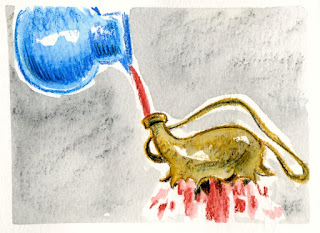Daily Devo w/ Pastor Eric September 30, 2021
Becoming What We Believe
Matthew 9:27-34, The Message - As Jesus left the
house, he was followed by two blind men crying out, “Mercy, Son of David! Mercy
on us!” When Jesus got home, the blind men went in with him. Jesus said to
them, “Do you really believe I can do this?” They said, “Why, yes, Master!” He
touched their eyes and said, “Become what you believe.” It happened. They saw.
Then Jesus became very stern. “Don’t let a soul know how this happened.” But
they were hardly out the door before they started blabbing it to everyone they
met.
Right after that, as the blind men were leaving, a man
who had been struck speechless by an evil spirit was brought to Jesus. As soon
as Jesus threw the evil tormenting spirit out, the man talked away just as if
he’d been talking all his life. The people were up on their feet applauding:
“There’s never been anything like this in Israel!”
The Pharisees were left sputtering, “Smoke and mirrors.
It’s nothing but smoke and mirrors. He’s probably made a pact with the Devil.”
“Become what you believe.” I love Eugene Peterson’s translation
here. Jesus asks the two blind men if
they believe they can see by Jesus’s power.
They do and so Jesus allows them to become what they believe – men who
can see. It begs the question, “what do
you believe you can be with the touch of Jesus?”
Jesus
tells the newly sighted men sternly not to tell anyone, having to know that they
were going to tell everyone they met. I
wish I knew exactly why Jesus gave this instruction. I have heard many scholars float many
theories on the reason for the instructed secrecy, but none of them are
compelling to me. My best guess is that
Jesus didn’t want to become known as simply a healer. He wasn’t interested in becoming a spectacle for
thousands who wanted to see the next miracle rather than hear the announcement
that the Kingdom of God has arrived. The
healing Jesus wants to be known for is the ”healing” of the entire world.
Immediately
after this, Jesus casts out another demon from a man who could not speak
because of the hold the demon had on him.
The people’s reaction is that, “there’s never been anything like this
in Israel!” They can’t be referring to the healings for there were plenty of
documented healings in the Jewish scriptures (i.e…the Old Testament). It seems more likely that the people were
talking about the authority of Jesus. It
seems that nothing, not even demons can defy Jesus’s authority. The people are noting that a human being
seems to have Divine authority. Certainly,
as we have discussed in other passages, Matthew wants us to come to the same
conclusion as the people. There has
never been anything on the earth like Jesus. Have you, my friend, come to that conclusion?
Finally,
if the Pharisees were impressed by these events (and I believe that they were),
they are even more concerned about the fact that crowds are coming to the
conclusion that Jesus represents a brand new, never-seen-before revelation of
God’s authority. This is an Authority
which challenges the Pharisees own authority. Lest we think we’re better than
that, we would do well to consider the times in our lives when the next big
thing overshadows that old thing that we have. It’s hard to embrace Something, however
wonderful it is, when that Something is personally threatening. Make no mistake; if we truly embrace Jesus, it WILL require us
to let go of our own authority and power.
This
brings us back to Jesus’s question to the two blind men, “do you really believe
that I [Jesus] can do this [bring you sight]?” Jesus is asking the two men if
they believe that Jesus has the authority to command their eyes to see. The message here is that we can indeed “become
what we believe,” but not by hard work and positive thinking. We become what we believe when place ourselves
fully under the authority of Jesus. Tomorrow,
we’ll explore some the implications of this. But for now, consider again the questions above.
Questions: What do
you believe you can become with the touch of Jesus? Have you come to the
conclusion that there is no one in history with the authority that Jesus has?
Prayer: Lord Jesus,
demons believe in your authority and shudder. Storms obey your every
command. Diseases and afflictions fall
away at your touch and/or word. Yet, we
confess that we sometimes struggle to trust your authority. “Have mercy on us, Son of David.” Help us become what we believe by fully
submitting to your Lordship. Amen.
Prayer Focus: Pray
for God to give you a vision and faith for what you can become by Jesus’s authority.
Song: So Will I –
Hillsong Worship
https://www.youtube.com/watch?v=GfVd5x9W1Xc











